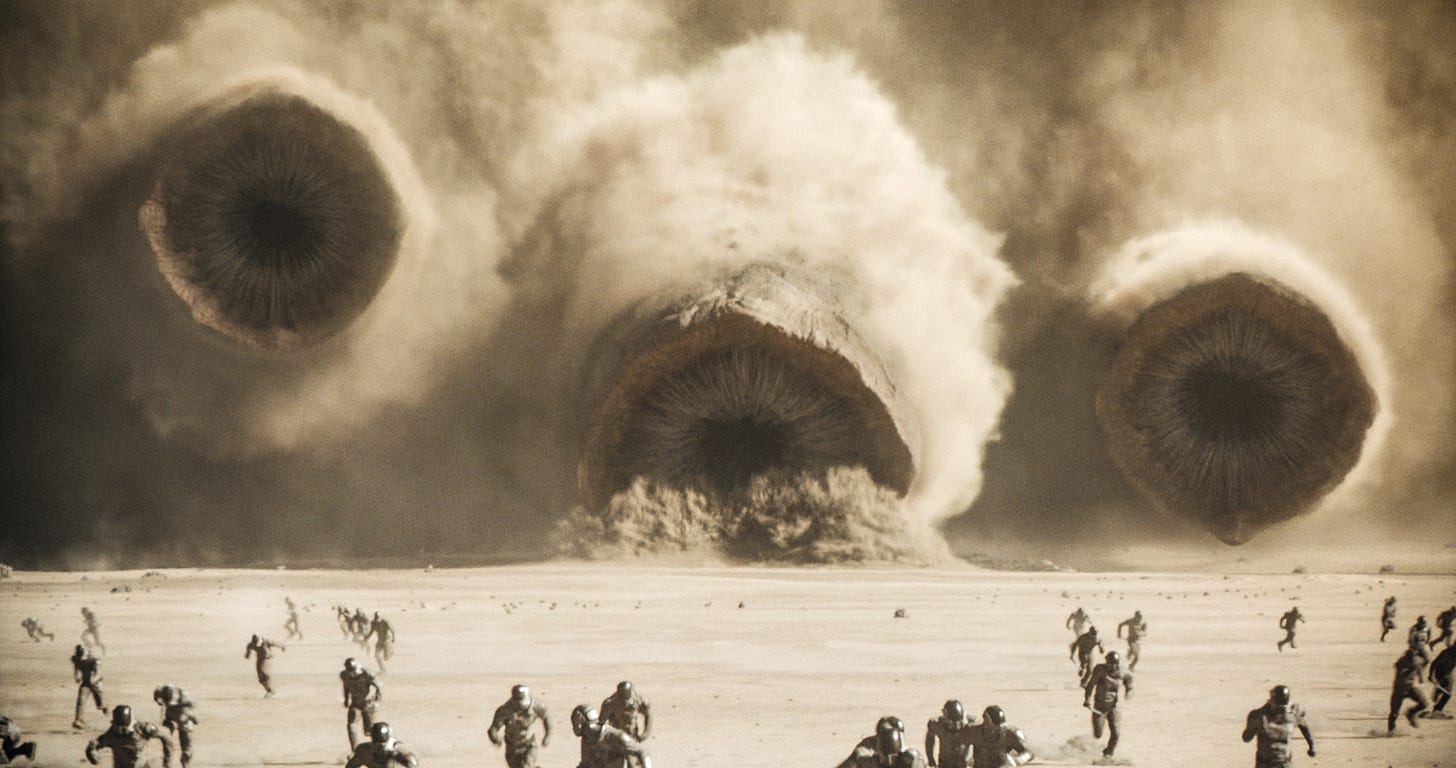‘Dune: Part Two’ exceeds expectations in every way—except humanity
Visionary filmmaker Denis Villeneuve doubles down on immense production design, complex religious themes, and coldblooded political machinations
The inevitable analogy of Denis Villeneuve’s Dune: Part Two as The Empire Strikes Back to Dune: Part One’s Star Wars was recently highlighted by Christopher Nolan. The Empire Strikes Back has become the paradigmatic genre sequel that surpasses the original, and the standard by which every ambitious second film in a series is measured. And the debt of George Lucas’s Star Wars mythos to Frank Herbert’s Dune novels (a corrupt galactic empire, a quasi-religious order with mind-control powers, etc.) is substantial enough to make comparisons unavoidable. When the sequel depicts the young protagonist going into hiding, undergoing intense training and visionary trials, and eventually confronting a terrible revelation about his ancestry — all visualized on an overwhelming scale, with images of staggering power and utterly persuasive visual effects — the comparison becomes almost redundant.
Yet it would be equally true, if not truer, to call Villeneuve’s Dune movies a kind of anti–Star Wars. I’m tempted to call them the definitive anti–Star Wars movies, and Dune: Part Two the anti–Empire Strikes Back. Indeed, to speak as I did above of the “Star Wars mythos” suggests the characterization of the Dune saga as an anti-myth. For all that Lucas drew from Dune in crafting his galaxy far, far away, the whole outlook and tone of Star Wars owes more to inspirations celebrating the triumph of good over evil, from conventional Westerns and serialized sci-fi swashbucklers to J.R.R. Tolkien’s implicitly Catholic The Lord of the Rings. By the end of Dune: Part Two, it’s clear that while the idea of “the triumph of good over evil” is popular in some regions of the Dune universe, that idea is a cruel lie in a harsh cosmos with no lack of overwhelmingly evil forces and Machiavellian power players, but a dearth of powers worth rooting for.
Dune: Part Two draws overtly on one of Herbert’s key inspirations, David Lean’s iconic Lawrence of Arabia: another quasi-messianic tale about a privileged imperialist going native in the desert and galvanizing a guerrilla resistance in a holy war that never delivers on its glorious promise.
Villeneuve’s two-part story offers a “Hero’s Journey” story that throws a deeply skeptical light on the very idea of heroism; an instance of what anthropologist Manvir Singh dubbed the “Sympathetic Plot” with a protagonist who is in some ways strikingly unsympathetic. And while the Jedi mysticism of Star Wars could be called, if not pro-religious, at least “spirituality-positive,” the Dune saga offers a mixed critique of Abrahamic-style faith. In Star Wars, skeptical characters who mock “sad devotion” or “hokey religions” sooner or later learn the error of their cynicism. In Dune: Part Two, warnings like “If you want to control people, you tell them a messiah will come…they’ll wait for centuries” and “This prophecy is how they enslave us!” come from the most sympathetic and grounded character, the young Fremen woman Chani, played by Zendaya.
At the same time, perhaps reflecting the director’s mixed feelings about his Catholic upbringing, faith in Villeneuve’s Dune films is double-edged. While religion can function as a tool of manipulation and oppression, it can also enable people to do the otherwise impossible, such as survive in the harshest regions of the desert planet of Arrakis. It’s no coincidence that it’s the “uninhabitable” south that we find the most devout Fremen, the ones waiting for a messiah figure. Faith can even be a force of resistance, as Florence Pugh’s Princess Irulen points out to her father, Christopher Walken’s Emperor, warning him against using military force against devout opponents: “You underestimate the power of faith.”





